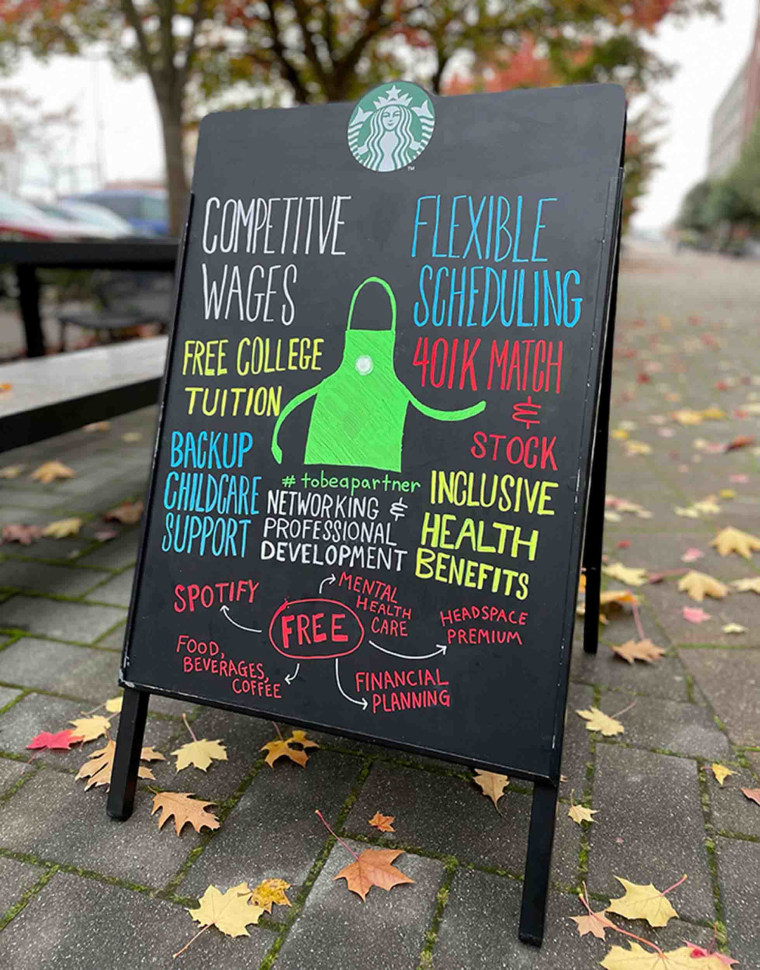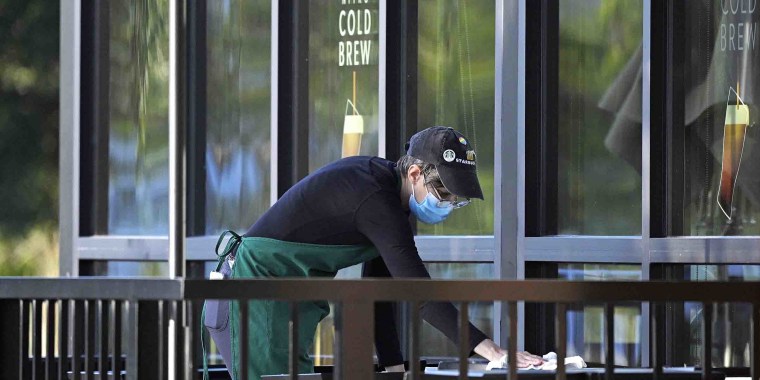Starbucks announced Wednesday it will be raising its minimum wage across the country to $15 an hour. The news comes amid a labor shortage that has swept the country in the wake of the COVID-19 pandemic, and after President Biden signed an executive order in April raising federal contractors' minimum wage to $15 an hour. Starbucks said the pay increase, which is set to be enacted by summer 2022, is one of the most significant investments in its "partners" (what the company calls its employees) in its history.
According to the announcement, the pay hike will "recognize and reward" tenured staff, with hourly employees earning an average of $17 an hour and a new range of $15 to $23 an hour for baristas by the summer.
In November 2020, Starbucks increased its hourly wages for baristas as voters showed support for a higher minimum wage. But, according to Business Insider, many Starbucks workers have been pushing for an across-the-board pay raise, petitioning for a $15 minimum starting wage. Analysts say a pay hike would cut the company's bottom line, particularly because they are not a franchise and therefore have no franchisees to cover the added costs.

"As Starbucks celebrates our 50th anniversary we are reminded that our heritage is based on the simple concept that our green apron partners are the heartbeat of Starbucks and that success is best when it’s shared," said Kevin Johnson, Starbucks president and chief executive officer. "Today, we are announcing another historic investment in our partners, knowing that when we take care of our partners, they take care of our customers, and all stakeholders benefit. This is how we continue to build a great and enduring company. One that is committed to the ideal that doing good for one another – and for society – is good for business over the long-term."
Many companies have tried to attract more employees with increased pay during the country's labor shortage which has seen workers quitting and stores closing early due to being understaffed. And the plight of food workers during the pandemic has not made it any easier to bring on new talent right now.
In a letter to all U.S. Starbucks employees, Rossann Williams, Starbucks' executive vice president and president of North America, said the "partner experience" was essential to Starbucks.
"When others were closing stores and laying off people, we doubled down with COVID-19 pay and benefits AND we made a record investment in partner wages and experience," said Williams in the letter. "And today, we're announcing yet again one of the biggest partner investments in our history!"
Effective in late January 2022, employees with two or more years of service could receive up to a 5% raise and staff with five or more years could receive up to a 10% raise.
In today's job market where there's a noticeable shortage of workers, Starbucks said they will double down on recruitment, extending $200 referral bonuses to help attract new talent.
Williams said in the letter that these raises represent an investment of more than $1 billion on the part of Starbucks in less than 24 months and that the investments the company will be making go beyond enhanced wages.
Starbucks will also invest in more in-store training for new hires, redesigning their "Barista Basics" program and increasing training time for all roles.
Further innovations will include testing of a "shifts app" that would make it easier for partners to work available shifts that meet their personal needs, improvements in store design and equipment and testing a Cold Beverage Station in select stores around the country.
All this comes as Democrats seeks to increase the federal minimum wage, which is currently $7.25 to $15 an hour. Some economists think that the rate increase is a good idea as jobs in the service industry are necessary and demanding, while others say the hike would make it difficult for many restaurants to stay in business.
"Research has shown companies that pay higher wages have lower turnover, which can raise productivity through lower search, training, absentee and vacancy costs and higher morale," Erica Groshen, Senior Economics Advisor at the Cornell University School of Industrial and Labor Relations, told TODAY Food. "So, there is a benefit to the companies that can mitigate the apparent higher costs of raising wages."
Groshen believes it is possible for business profits to be higher with higher wages.
"For the restaurant and other industries, this may lead some companies to change their business models to offer better-developed career paths and emphasis on worker training, rather than hoping that robots will lead to a minimum number of interchangeable workers," she said.
"Median worker compensation in inflation-adjusted terms has been stagnant for 40 years," she continued. "It is possible that the pandemic has triggered a combination of individual, corporate, policy and organized actions sufficient to finally move the needle."


